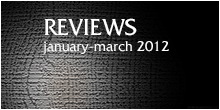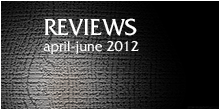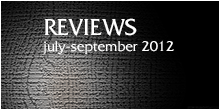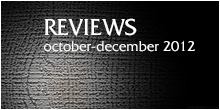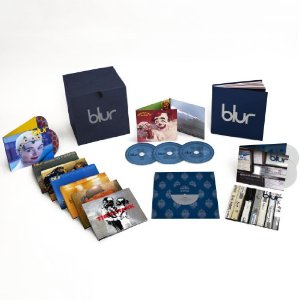Blur - Blur 21
EMI
Released: 30th July 2012
There is little doubt of Blur’s place in the pantheon of alternative music. Despite the doubters – and there were many – this conflation of personalities, styles and influences who never seemed to fit comfortably together, nonetheless attracted unswerving devotion while notching up eleven top ten singles (including two number ones) and five number one albums. Bordering on indefinable, their shifting approach to their music was a result of their attempts to balance a growing natural maturity with well reported internal divisions that continually threw them off balance. But as they fought and stumbled, they managed to remain close to the hearts of the public and when hints of new recordings came to light recently after nine years of silence, the excitement was palpable. It now looks likely there will be no new album, but in recognition of the band’s notable career, this box set has been compiled twenty-one years on from the release of their debut album,
Leisure.
Make no mistake, Blur 21 is a decent package and can justly claim to be the definitive anthology of Blur’s career. Housed in a well thought out material-covered box, contained within are remastered versions of all seven albums, each coming with a bonus disc featuring every b-side from every single and EP release as well as non-album singles such as ‘Popscene’ and the fan club single releases. This in itself brings you an astonishing 115 extra tracks to which you can add four more discs of demos and rarities, three DVDs of live performances, a seven-inch single of an unreleased Seymour track and a hard-bound book. Each box also includes a code to download all the audio contents as high-quality mp3s. Nice work indeed.
Blur’s history is really the story of independent music in the 1990s. Arriving on the scene at the back end of the Madchester era and the dawn of Shoegazing, they rode the Britpop wave, embraced its more introspective aftermath, and fell apart at the end of the decade, possibly the lowest ebb ever for alternative music, and though some of Blur released the band’s final album Think Tank in 2003, it was clear the race had been run.
August 1991’s Leisure was bi-polar in mood, momentarily bubbling with life-affirming joy before sinking into alarming melancholia with downbeat numbers such as ‘Sing’ and ‘Wear Me Down’. Musically, too, it see-sawed, ranging from the dance-orientated tunes ‘There’s No Other Way’ and ‘Bang’ through the sixties psychedelia of debut single ‘She’s So High’ and the excellent ‘Bad Day’, to the Shoegaze guitar washes of ‘Repetition’ and ‘Fool’. The three singles taken from it had mixed success, though one top ten hit brought them into the public’s gaze, but on its release the album was regarded as a critical disappointment despite there being much to commend it. With the record label pressing the band to pursue the Madchester sound which had graced their two most successful singles, Blur did completely the opposite, with May 1993’s Modern Life Is Rubbish remaining free from any trace of a groove. Having embarked on a long US tour just as Nirvana had stormed to prominence and made them an irrelevance before they had even begun, Blur turned their eyes homeward and began to focus on capturing snapshots of British life, both in their lyrical outlook and by referencing in their music such quintessentially British bands as The Jam, The Small Faces and The Kinks, producing what in truth was literally ‘Britpop’ in the face of American indifference. The new album was a much more coherent affair than its predecessor, housed in a sleeve featuring a painting of the speed record-breaking steam locomotive 'Mallard', hinting that Blur were steaming ahead into new territory, but remaining resolutely at home. Three singles broke the top thirty, though they should have done better as two of them were particularly excellent, ‘Chemical World’ both hard-hitting and harmonious, while the Bowie-by-numbers ‘For Tomorrow’ remains one of the best things they ever recorded.
Eleven months later in April 1994 Parklife showed the band had not only refined their new direction, but had made it more melodic and accessible. A loosely connected series of vignettes of British life, few albums had ever come closer to capturing the mood and spirit of the Kinks’ classic 1967 album, The Village Green Preservation Society, though whereas Ray Davies’ masterpiece had flown in the face of prevailing winds and had sunk without trace commercially, Parklife touched a chord with the mood of the nation and stormed to the top of the charts, going platinum four times in the process. The synth pop of ‘Girls And Boys’ secured the band’s place as big hitmakers, though the astonishing ‘Parklife’, narrated by actor Phil Daniels, probably secured their place in musical history as one of the brightest and most innovative bands of their generation. Despite four singles being lifted from the album, all of which did a job, this still left twelve other tracks of generally fine quality. The careering ‘Tracy Jacks’, the charmingly wistful ‘Badhead’, and the bubbling ‘London Loves’ with its understated keyboards and fine work from guitarist Graham Coxon, showed there was plenty left in the tank.
If Blur had any doubts about following up such a giant of an album, they showed no signs of it when The Great Escape followed in September 1995. A series of snapshots of the darker side of British life, the album focused on detachment and isolation, most of the lyrics touching on loneliness, something lyricist Damon Albarn later confirmed was largely autobiographical. Musically, The Great Escape was more intricate than Parklife and though it may have lacked some of the charm of its predecessor, much of it is extremely good and songs such as the singles ‘Charmless Man’ and ‘Country House’ (Blur’s first number one single) were marvellous creations. As the highy lauded album again registered platinum sales, the only downside to the band’s success was the effect it was having on Coxon who was increasingly alienating himself from the rest of the band. The guitarist wrote to Albarn saying he wanted to make ‘music that would scare people’ and to ‘be part of a band that meant something that he believed in.’ Albarn himself was keen to change direction and make music through which he could more easily bare his soul, rather than continue with a succession of detached narratives. The result was a complete change of style with the Blur album, released in February 1997. Musically owing more to grunge and lo-fi, or even the sounds Blur naturally made when playing live or jamming in the studio, Coxon is in explosive form as the band unleash a series of punishing rockers and deconstructed slow-burners, though Albarn’s natural ear for melody still manages to make the whole appealingly accessible. Many thought this was a deliberate attempt at uncommerciality, but Blur became the band’s third successive album to hit the top spot in the charts, with the anthemic ‘Song 2’ helping to break them in America for the first time. The same song reached No.2 in the UK singles chart, following on from ‘Beetlebum’ becoming their second No.1 hit. ‘On Your Own’ reached No.5 and ‘MOR’ No.15 as contrarily Blur became the band’s most successful album of all time.
The drift towards experimentation continued with March 1999’s 13, which was largely pieced together by producer William Orbit from studio improvisations. The band’s most openly emotional record, it was little more than the sound of Blur collapsing as personal relationships both within and without the confines of the band fell into disarray. Described by Coxon as a ‘blood-letting’ it was painfully raw, but somehow uninhibiting, leading to some extremely imaginative playing and an album of quite notable maturity. Again the record buying public sent the album straight to number one, with the gospel-tinged lament of ‘Tender’ reaching No.2 in the singles chart. 13 was more or less the end of the band. With Albarn involved with his Gorillaz project and only returning to Blur as he felt it was expected of him, work eventually began on Think Tank. Coxon failed to make the early recording sessions, struggling with his alcohol habit in rehab, and when he finally arrived on the scene, a lot of the album had already been written and his frustrated bandmates thought it better if he left them to it. The finished article has its moments, but guitar bands without guitarists, are by nature in a dismal situation and so Blur sadly went on their way with what might have beens ringing in the air.
There’s over eighteen hours of music here, nearly six hours of it previously unreleased, and to work through it all is to embark on a fascinating journey tracing the birth, growth and collapse of one of the nation’s best-loved bands in intimate detail. At around £130, it ain’t cheap, but at around ten pence a minute it doesn’t seem so bad.
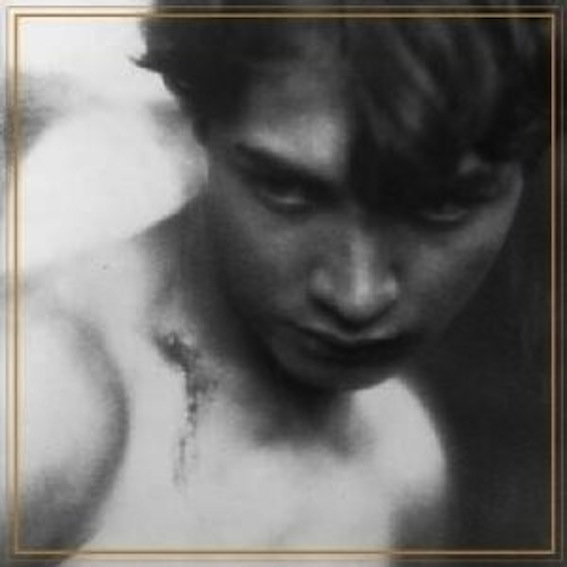
Holograms – Holograms
Captured Tracks
Released: 6th August 2012
The American label Captured Tracks has proved itself to be pretty sound over the past few years and has pulled off a bit of a trick by snapping up Swedish proto-punksters Holograms in front of any of its British counterparts and now follow up March’s limited ‘ABC City’ seven-inch single with the release of the band’s self-titled debut album. Having had appetites whetted by Savages’ marvellous debut last month, Holograms also reveal themselves to have an inate understand of the post-punk dynamic and how to construct an all-consuming mood of menace, here built around threatening guitars and hollow vocals unfolding tales of desperation. In many ways this album echoes those by some of the more obscure of the underground early eighties’ post-punk outfits, such as In Camera, but the approach is not so narrow; its wider focus incorporates seventies’ punk sounds with even some later street punk thrown into the mix. The secret, however, is in maintaining a coherent mood despite this variation and Holograms achieve this effortlessly, infusing everything with a convincing blankness, a thrilling reminder of better moments from better days. Apparently meeting in run-down streets working at dead-end factory jobs, Holograms’ music echoes the drudgery of that hopeless existence, while shaping it into something quite beautiful in its utter desolation. They are at their best when at their starkest, the opener ‘Monolith’ setting the scene, a classic of the genre, bursting into energy from bleak beginnings, but failing to force its way out of its self-imposed prison. ‘Orpheo’ is as trapped, held in place by a repetitive guitar loop, reinforced by the saddest of keyboards, and dying to the repeated lament of, ‘We’re running out of time.” ‘A Tower’ completes the trilogy, a two-minute stormer that could have come straight out of the 1981 4AD archives. Add to this hints of the ragged assurety of the Libertines (‘Astray’ and ‘Fever’) and the edgy dynamics of the prime time Cure (‘Memories of Sweat’), and there is much here to embrace. Even at their most generic when they venture into chugging punk territory as on ‘Chasing My Mind’, the song is given another dimension by fairground synths, and the street punk ‘ABC City’ is lifted by the most glorious and unexpected of guitar solos. Albums such as this are rarities in 2012; it’s a remarkable thing and well worth investigation. Sod it, just buy it. This year is getting better and better.
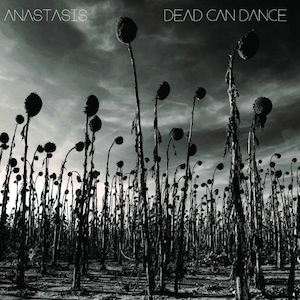
Dead Can Dance - Anastasis
Pias
Released: 13th August 2012
In this year of resurrections, Dead Can Dance are the latest act to emerge from the underworld with new material, some sixteen years after 4AD released their last offering, Spiritchaser. Their eighth album in twelve years, this had seen the band’s sound reaching out to encompass a wider vision of world music, the final stage in their progression from mythical Greece, through medieval Europe, to the Middle East, the Orient and beyond. Though in places Anastasis echoes this journey, there is much linking it with their 1984 eponymous debut which stepped out of nowhere to summon forgotten shades of the classical world. It is still astonishing to listen to early tracks such as ‘Frontier’ and ‘Threshold’ where Lisa Gerrard’s other-worldly vocals soar to capture the calls of ancient civilisations before quickly melting back into the mists of time. And where her voice thrilled the soul, Brendan Perry’s narratives echoed forlornly, his hollow tones and measured delivery perfectly capturing the desolation of civilisations lost, heroes fallen and hopes denied. The cover of Anastasis depicts a field of dead sunflowers and, of course, nothing has altered. How can you change the past or remodel half remembered dreams? All of Perry’s songs sound the same; capture the same moods with the hint that behind the helplessness of mortal existence something greater is pulling the strings. An inescapable destiny. There truly is a gothic splendour to it all, underlined by the trumpeting of ancient horns, strings sweeping like ghosts and inexorable, rattling drums. Gerrard’s voice retains its magic, yet loses some its ethereal charm through the epic nature of the songs. Only one track here is under six and a half minutes, ‘Kiko’ passes over eight, and rare duet ‘Return Of The She-King’ is little more concise; the whole assumes an empyrean magnificence rather than offering bewitching fragments of earthly delights. This may rob Anastasis of some passion, but it is pretty as hell. It would be difficult to listen to this record and not be moved to some extent. It has an enveloping elegance that can only be admired and if there is poetry in your soul, this will find you out.
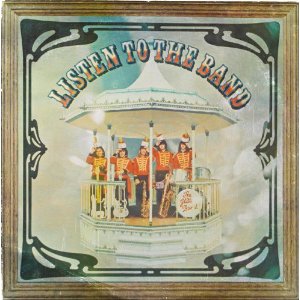
The Glitter Band - Listen To The Band
7Ts
Released: 13th August 2012
Like most media-fashioned genres, Glam Rock was never a coherent movement but a general term inspired by the reintroduction of glamour into music after the miserablism of late sixties rock. Giving credence back to the seven-inch single with a remarkable series of snappy, vigorously commercial pop tunes, Glam resurrected excitement and verve and gave a whole new generation of kids something of their very own to treasure. Of course there were rising stars of boundless talent who were happy enough to dance in its light momentarily before moving on to greater things, such as Bowie and Roxy; there were astoundingly talented rock bands whose appeal went way beyond the teenage fringes, such as Mott and Slade; and there were those who saw possibly a last chance for glory in milking the glam sparkle for all it was worth and appealing to the lowest common denominator, enter Alvin Stardust and Gary Glitter. Glitter's rise to prominence in 1972 raised some problems for the singer, whose music had been created in alliance with producer Mike Leander. 'Rock 'n' Roll' looked like becoming a big hit and television appearances were beckoning. However, it was the instrumental 'Part Two' that was really taking off which meant visually there had to be a band to back Glitter whose contribution to that track would be little more than some vocal filling. The answer was to recruit members of the Boston International Showband who had worked with Glitter when he was known as Paul Raven and they appeared together for the first time on
Top of the Pops on 22nd June 1972 (with Mike Leander on guitar), originally being named the Glittermen. This band was to back Glitter until his 'retirement' in 1976, soon being re-named The Glitter Band, but their impressive stage performances, underlined by the mesmerising attraction of two drummers playing in synchronicity, saw rising interest in the band as a separate unit, and after Leander gave them some studio time in December 1973 to put together some of their own songs, they soon found themselves at the top end of the charts with a series of huge hit singles.
Their debut album Hey! (of course) captures all that was wrong about the bottom end of the glam market: the over use of godawful covers of old rock and roll standards to make up for a lack of decent originals. If you can listen to ‘Sea Cruise’, ‘All I Have To Do Is Dream’, ‘Sealed With A Kiss’ and ‘Twisting The Night Away’ without retching you have inner strength, but surrounding the dross were songs of an entirely different nature. Written by members of the band, ‘Angel Face’ more than any other song captures the best of the ‘Glitter’ sound – a heavy rhythm, bursts of distorted guitars and plenty of ‘Heys!’ – and it’s great. ‘Just For You’ follows in the same vein and ‘Shout It Out’ clearly demonstrates the band have songwriting talent in abundance.
Moving on to 1975, Listen To The Band was the group’s third album and, having previously been available only on a fanclub release, has now seen light of day on Cherry Red’s 7Ts label with the bonus of twelve extra tracks. Recorded only five months after Rock ‘n’ Roll Dudes, all eleven songs were self-composed, and demonstrated not only how prolific and hard-working the band were, but how much they had evolved over the past two years. Listen to Hey! and then Listen To The Band and you would swear it was two different groups at work. The latter encompasses a marvellous mixture of styles, ranging from harmonic rock to melodic pop, from funk to disco, all beautifully crafted and sounding terrific on the new remaster. In fact ‘Makes You Blind’ was a huge disco hit in the USA, as far removed from Glitter roots as you could get! The down side for the band was that though they could still hit the top ten with singles such as the fantastic ‘People Like You And People Like Me’, the album-buying public did not seem prepared to give the maturing band a chance and, though they were producing the best music of their careers, Listen To The Band failed to chart. Like Mud, who wrote some seriously good songs as their popularity declined, it appeared the tide had turned and the arrival of Punk the following year meant nothing would ever be the same again. The Glitter Band have remained a draw on the live circuit and put on a mighty fine show, but Listen To The Band remains the peak of their career and a vivid snapshot of the state of the nation in the last days before the coming revolution.

Bloc Party - Four
Frenchkiss
Released: 20th August 2012
Having reached an impasse following the release of the unconvincing Intimacy album in 2008, Bloc Party, once the brightest new kids on the block, fell into disarray and it seemed unlikely the original four piece would ever reassemble to make new music. Tales of paranoia and suspicion abounded when it was rumoured singer Kele Okereke had been ousted by the group, but this appeared to be a case of media manipulation when the release of Four was eventually announced, the main worry then being whether the goup would continue on the path towards dance music which had begun with Intimacy and continued with Okereke’s 2010 solo album The Boxer. Thankfully these fears are dispelled with opener ‘So He Begins To Lie’ which blasts off at different angles all at once, revealing the band at their spiky and awkward best, appealingly unlinear, weighty and simply ending when it has had enough. Russell Lissack shines, and his skewed guitars are the undoubted star of the show throughout, not only birthing a harder and more fearsome Bloc Party, but stretching the boundaries of intricacy and experimentation while not quite breaking through into new territory. Thus, we have a recognisable Bloc Party sound, but a totally new approach. ‘3x3’ is driven madness, Okereke soaring from dangerous whisper to desperate wail in the album’s dramatic high, while ‘Kettling’ stings and crushes with fearsome intensity, the suffocated vocals failing to break through Lissack’s sonic weaving. Not that the guitarist has it all its own way. Okereke sparkles on the beautiful ‘Day Four’ with its more familiar, lighter approach; his vocal is simply gorgeous and the band restrained until embarking on a quite lovely outro that sounds like dancing gold. Despite the ferocity which adorns much of this album, the band can still capture tenderness and when Lissack is content to simply complement the rhythm section rather than fly off in all directions, the gentler, more sensitive side of the band emerges. ‘Truth’ is another touching moment of tenderness and ‘The Healing’ a dreamy, Shoegazing wander through summer days. There are very few lows. The Beatles’ blues of ‘Coliseum’ raises an eyebrow, the rather plodding ‘V.A.L.I.S.’ is a little tiresome, and the punk explosion of ‘We Are Not Good People’ is either a step too far or a work of genius, but these are minor grumbles. Four is a terrific record, recorded simply and cleanly and a mighty statement that the boys are back. Bigger complaints are that the autumn tour touches neither Brighton nor London, and the artwork for the album, usually one of the band’s strong points, is awful.
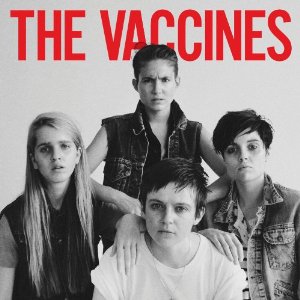
The Vaccines – Come Of Age
Columbia
Released: 3rd September 2012
We never really understood the rather intense media hype that built up around The Vaccines on the release of their debut album, last year’s What Did You Expect From The Vaccines? It was a painfully retro record which left you spending more time picking out influences than actually enjoying the music. Possibly that rather limited sixties tune-transfusion was a shade brighter than most of the competition, but in 2011, one of the worst years in living memory for new music, the competition was certainly limited. Some sixteen months down the line and things have livened up considerably and The Vaccines needed to respond with something a little more challenging if they were still to be taken seriously as first rate contenders. Happily, The Vaccines Come Of Age is a different beast to its predecessor. OK, it is still caught with more than one foot in the past, but it does show more intricacy, imagination and, best of all, intelligence than its predecessor. Don’t expect anything from a different planet to the debut, but there is a nice spirit about this record which is recorded live and makes no pretence to be more than it is: a melodic and enjoyable forty minutes that will occasionally gnaw into your brain and more than occasionally make you want to get up and dance around the room. There is some good guitar work: splendidly dirty on ‘Aftershave Ocean’, pleasingly plaintive on ‘All In Vain’, and bouncingly punky on ‘Bad Mood’, quite possibly the album’s highlight. Justin Young’s vocals are better across the board, less inclined to hide in the background, and he confidentally plunges through such delightfully wordy songs as the opener ‘No Hope’ and the bassy ‘Ghost Town’, while he often enunciates nicely and shows there is more than one side to his vocal style on ‘I Wish I Was A Girl’ and ‘Lonely World’. Yes, of course there are moments when The Vaccines still sound like a poor man’s Libertines or Strokes, but they are few and far between and in this collection of songs you cannot deny they have taken a mighty step forward. This won’t change your life, but it’s pretty decent. And credit for that.
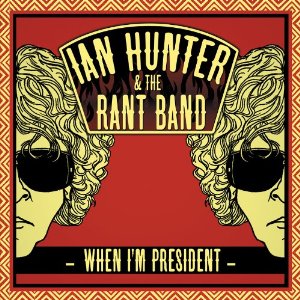
Ian Hunter - When I'm President
Proper
Released: 3rd September 2012
We make no secret of our admiration for Ian Hunter. As the front man of one of the most influential, most intelligent and certainly the most intense rock bands in musical history, his songwriting was simply astounding. Able to lay bare the most sensitive and fragile of emotions, Hunter could also send your spirits soaring to the heavens or rouse you to tear a building apart in a fit of mindless rage: truly a writer with an inate understanding of the power of music and the efficacy of the right word in the right place. Since leaving Mott The Hoople, his solo career has seen plenty of ups and downs. Beginning with a series of astounding recordings up to 1980, his star plummeted through the eighties before he once again teamed up with old friend and undoubted genius Mick Ronson for 1990’s
YUI Orta. Ronson’s death from cancer in 1993 came a a hammer blow for Hunter who shied away from recording for some years until gradually resurfacing in the late 1990s. It was the release of
Rant in 2001 that truly got his career back on track, with the band assembled to record that album now pretty much a fixture, and the release of
Shrunken Heads (2007) and
Man Overboard (2009) found the old warrior in imperious form. Any man who can get the word ‘unexpurgated’ into a rock song is worthy of admiration, but one who can write such an addictive number as 2009’s ‘The Girl From The Office’ some forty years down the line is somebody with a very special talent indeed. Three years on from his last release, with the astonishingly successful Mott reunion concerts intervening, Hunter now returns with
When I’m President, his fourteenth solo album and he shows little sign of slowing down. Heavier than his past few outings, Hunter is in his element when rocking out, and though he can write a devastating ballad, here he emerges with some of his most convincing rockers since ‘The Loner’ back in the Ronson days. ‘What For’ is a stormer, ‘I Don’t Know What You Want’ is gloriously heavy blues, and the whole album is infused with a welcome toughness. ‘Fatally Flawed’ opens in familiar balladeering territory, but erupts into furious life with some terrific guitar work, and its light and heavy approach is an undoubted highlight; musically Hunter is not as innovative as once he was, the singer leaning towards a more generic approach which is perhaps an inevitable consequence of his long-term American residency, and it is good to see him attempting to stretch boundaries once again. Lyrically, this is less politically direct than some of his recent releases, though Hunter has a keen eye and little escapes him, not least the power a woman can hold over a man. And he is still capable of delivering lines no other singer in rock would dream of uttering, “Black tears, vulnerable veneers, just another weapon in your arsenal of fear” – terrific stuff. Hunter has astonishing energy and continues to play both the UK and USA every year with his current tour hitting these shores next month (including Brighton Concorde 2). “I can’t believe after all of these years, you’re still here and I’m still here,” he intones on ‘Life’. We’re just glad that he is ... and long may he continue to be so.

Toy - Toy
Heavenly
Released: 10th September 2012
Having fled the numbing exuberance of the Jing Jang Jong, recruited some keyboards and regrouped as a five-piece, Toy have spent the past couple of years immersing themselves in a diverse array of musical genres and carving out a new path through the musical underground. And underground is a fitting description for their debut album, as this is very much music for tunnellers, an experience akin to spending the night on the Circle line: always on the move but never breaking free, knowing the world is flashing by, but remaining hemmed in, unable to reach the light. This is a record without peaks or troughs, frighteningly one-eyed, but despite its inherent claustrophobia Toy still manage to make the journey intriguing, attractive and even uplifting. And this is a remarkable thing. Dip an indie pop band in Neu!, throw in some West Coast harmonies and add a lightly psychedelic edge and you come close to understanding this record. For buried beneath the heavy coating of droning keyboards, metronomic drumming and numbing repetition, there is life to be found: dancing basslines, warped and shackled guitars, and vocals that barely stray from the monotone, yet carry enough subtle force to play havoc with your emotions. And there’s hooks ... and melodies. The instrumental ‘Drifting Deeper’ glows in space age gothic splendour, feeling like the missing link between Station To Station and Low, while ‘The Reason Why’ swerves momentarily off track to swoon like My Bloody Valentine with some beautifully restrained guitar work, and is worth every second of its near eight minutes. The heavily confined guitars try their best to break away on ‘Motoring’ which borders on driving pop, while the brilliantly-titled closer ‘Kopter’, tipping a hat to obvious Germanic influences, fails to start as it means to go on, with smothering guitars crashing in waves over its autobahn beat and the whole building up into a scarf-waving finale. The beauty of the post punk world was that it left all doors open for exploration and it seems some new bands are at last realising the key to artistic success is in taking their own paths and seeing where they lead. Like most great records, this one is a grower and every play reveals something else to enjoy. Take your time with it, Toy are going nowhere. Fast. Released on double vinyl as well as CD, the place to buy it is Rough Trade where they are giving away a frighteningly limited album of BBC Sessions with initial purchases.

Race Horses - Furniture
Stolen
Released: 10th September 2012
Goodbye Falkenburg was one of the more pleasant surprises of 2010 and revealed Race Horses to be true inheritors of the legacy handed down by Gorky’s and Super Furry Animals. Not just because Race Horses are Welsh and occasionally sing in their native tongue, but because, like their peers, they are able to produce melodic pop music of a truly outstanding quality, often with no little pyschedelic edge and more than a little quirkiness. Furniture is a very different beast from its eclectic predecessor in that it is considerably more focused, seldom swaying from classic pop structures, though thankfully the band still manages to embellish their songs with a freshness and a sparkle that leaves the whole sounding bright and ceaselessly entertaining. It was always amusing when SFA made claims their new record would be ‘mainstream pop’ when it turned out to be as bonkers as all the others had been. Race Horses also claim plenty of mainstream influences, including Michael Jackson and Queen, on shaping the sound of their new opus, but Furniture comes across as something startlingly original and teasingly hard to tie down. Singer Meilyr Jones has a light, pleasantly accented voice and intones like Russell Mael of Sparks, ‘Bad Blood’ being the most obvious example, and there are often hints of that startlingly original seventies’ band, especially in the crispness and assertiveness of the songs. For there’s definitely an air of confidence in this record, from the synth pop of opener ‘Furniture’ with its terrific drum collision in the middle, through the bouncy and slightly deranged ‘Mates’, to the welcome guitar attack that carries away the second half of the gentle “What Am I To Do’. This is all good stuff, but Races Horses reach even greater heights with the gloriously melodic ‘Sisters’ which opens like an old Motown tune, is built up with some lovely warped guitar bursts, and ends in a harmonic indie-pop dream. Lyrically, Furniture touches on themes of detachment, anxiety and entrapment, of society often restricting freedom rather than setting you free, and this only serves to underline the intelligence running throughout this release. Furniture is cleverly done, nicely made and bright as a button. Well worth investigation.

Ringo Deathstarr - Mauve
Club AC30
Released: 24th September 2012
Brilliantly-named Texas trio Ringo Deathstarr have been carrying a torch for UK indie music of the late eighties and early nineties for a few years now and with their second album proper, the equally brilliantly-named Mauve, show they have no desire to move on at all. This album is so set in the past it could be a museum piece, but the band confidently demonstrate a mastery of their subject and if you ever loved the shoegazing sound, you could well find this worth the effort. Name a band of that era and mindset and you’ll find it here. When Alex Gehring sings alone, she captures the spirit of Miki Berenyi and Emma Anderson wonderfully well, in her harmonies, phrasing and tone. When she sings with Elliott Frazier they distil the essence of Kevin Shields and Bilinda Butcher. Add some Slowdive dreamscapes and some Ride verve and you’re pretty much there. And it’s an enjoyable thing. In this world of tribute bands (thriving because the current music scene offers so little), why not a shoegaze reinactment society? No, it’s not original, but ’Rip’ sparkles like distorted Lush with the backing gently melting away before ending in the tinkling of bells, ‘Burn’ erupts like an MBV assault with its gentle male-female vocal defying the turmoil, ‘Girls We Know’ is Mary Chainesque in all its twisted sixties’ glory, and ‘Fifteen’ with its warping, melifluous harmonies is quite a lovely thing in its own right. Thirteen tracks, over half with monosyllabic titles and only a sprinkling of them over three minutes long, reveal a punk approach which is underlined on ‘Slack’ with its attitude and driven guitars, ‘Drain’ which crashes along like Ride on speed, and ‘Waste’ with its classic punk opening, melting guitars and machine gun drumming. Ringo Deathstarr: a melding of two cultures; Texicans who lost their souls to the Home Counties and wear their hearts unashamedly on their sleeves. You have to admire their nerve. But if you are going to be stalked, you want to be stalked by the best and Mauve is a splendid thing: stylish and likeable even if it is fixated and just a little bit worrying. But, hey, on ‘Do You Wanna?’ they almost sound American.
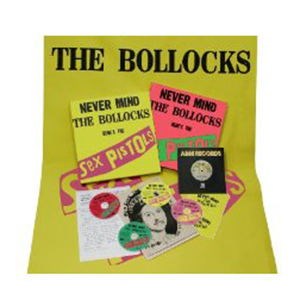
The Sex Pistols – Never Mind The Bollocks
Universal
Released: 24th September 2012
Quite simply the band who changed the world. It’s difficult for people to comprehend that statement this day and age, but in truth there are few aspects of life in the twenty-first century that haven’t been touched by the legacy punk rock bequeathed to an intolerant, rigid and violent society. Music, art, graphics, fashion, television, film, politics and even general attitudes to life all owe a debt to the sheer contagious energy, style and outlook of punk, and none of this would have happened without the Sex Pistols.
It’s thirty-five years now since the band released their one proper album and for all the worthiness of the Clash, the Damned and countless others, this stands head and shoulders above everything else the movement could throw together. To recognise this anniversary Universal have got together a special anniversary edition (or rip-off depending on your outlook) which includes three CDs, a DVD, a hardback diary of the band’s life in 1977, a replica of the ultra rare A&M release of ‘God Save The Queen’ and various other snippets including a full size recreation of the Bollocks poster originally given away with the album.
It’s pointless commenting on the main album here. The remaster is good, the sound is as clean as you want it, and it remains one of the greatest works of recorded music ever conceived. Rotten’s asides are peerless, his lyrics cutting and affecting even today, “We're the flowers in the dustbin ... we’re the future, your future” – was there ever a greater eulogy to a wasted generation? The second CD contains the non-album b-sides, which sound great remastered and are nicely mixed with barely a second between the tracks. Of special interest is the alternative version of ‘No Feelings’ taken from the aborted A&M ‘God Save The Queen’ single, with Rotten’s vocals right to the front and Jones’s guitar held firmly in the background. There are six demos produced by the band’s live sound engineer Dave Goodman taken from the Gooseberry Sessions which were the last songs recorded with Glen Matlock (and sound all the better for his basslines) between the band’s departure from EMI and their signing to A&M. Also included are eleven demos recorded by the band’s singles producer Chris Thomas. Unusually, the Pistols had different producers for album tracks and single tracks and often ended up with two versions of the same songs so it is great to have these versions readily available.
Disc three features live recordings of the band in Trondheim and Stockholm in 1977 and are more interesting than crucial, while the DVD captures some poor footage of the infamous riverboat party of June 1977, promo videos of ‘God Save The Queen’, ‘Pretty Vacant’ and ‘Holidays In The Sun’, live footage from Penzance (truly a rarity) and Stockholm (which has been out on bootleg many times), and a series of interviews including an unedited and hilarious interview with Rotten and Vicious for Radio One’s ‘Rock On’. The book offers a fascinating glimpse into history with great photos, newspaper cuttings and commentary, all of which stir the ghosts of half-forgotten days.
The whole package is nicely done, well made and thoughtful in that it is twelve inch album size and so can fit neatly into exisitng space unlike most other recent collections. Is it worth the ninety odd quid now being charged for what are probably a dwindling amount of copies? It’s a toughie, but if you do take the plunge you won’t feel cheated.
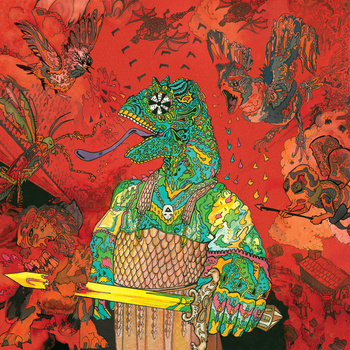
King Gizzard & The Lizard Wizard - 12 Bar Bruise
Same
Released: 24th September 2012
Anyone remember the exuberence of a King Kurt concert? It was more than a night out, it was explosion of life: a thousand limbs in motion, a primal beat in your ears and bucketloads of offal flying past your nose. You seldom got out unsullied, but the only real damage we ever suffered was a bash on the head by a cauliflower at a ‘vegetarian’ night. Listening to
12 Bar Bruise brings back these memories. It was ‘Dead Beat’ that first caught our attention, lifted from last year’s ‘Willoughby's Beach’ EP and sounding mightily impressive in a nasty alternative psychobilly gothic surf kind of way. Everything is thrown in the mixer, but what emerges is a sheer zest for life, with the glorious swelling noise carrying you away in a massive amphetamine breaker. The debut album simply carries on where that left off. The stuttering opening of ‘Elbow’ soon swells into a storm of screaming and feedbacking guitars, broken solos, classic rock asides and psychobilly chants, and we’re off on an exhilarating journey that encompasses bastardised surf rock, twisted blues bashes, spaghetti western theme tunes, Cramps howls, whirling rock and roll and surreal moments that sound strangely like Peter and the Test Tube Babies. And, hell, surely that sounds like the sadly missed Tracy Pew and Rowland S Howard playing on the stomping title track. It’s a highlight, as is ‘Cut Throat Boogie’ which one hell of a glorious racket with spitting vocals and a ‘Blundertown’ undercoat. But there’s not a lot wrong with any of this and when the gentlest track on an album is titled ‘Bloody Ripper’ you know you are on to a good thing. Seemingly released by the band themselves, you may struggle to get the album over here, but it is available on their
website in a limited edition red speckled vinyl edition (500), an even more limited cassette (100) and a CD which doesn’t appear to be limited at all. All come with free downloads, so every need is catered for. King Gizzard are currently touring their native Australia, and we wait with bated breath to see if they ever make it to these shores.

Crime & The City Solution - An Introduction To
Mute
Released: 24th September 2012
With Simon Bonney resurrecting Crime at the end of last year from his new base in Detroit and a new tour and album in the offing, Mute have moved quickly to release a compilation featuring the band’s work from their Berlin incarnation of 1987-1991. Having already had Sydney and Melbourne versions of the band, Crime & The City Solution were reborn in London in 1985 when Bonney (the only constant) teamed up with guitarist Rowland S. Howard and multi-instrumentalist Mick Harvey, fresh from the break-up of The Birthday Party, to release a series of impressively dark recordings. Internal divisions saw the band eventually split, with three members departing to form These Immortal Souls under the leadership of Howard, and Crime was re-born yet again in Berlin, Bonney and Harvey being joined by new musicians amongst whom was Alexander Hacke, formerly of Einstürzende Neubaten. The Berlin Crime released three albums on Mute in Shine (1988), The Bride Ship (1989) and Paradise Discotheque (1990) before Bonney decided they had run their course and headed off to the USA where he worked as a solo artist. This new compilation samples tracks from those three Berlin albums which have always remained closest to Bonney’s heart as the band at that time was undoubtedly his creation, the singer having the major hand in composing both the music and the lyrics. In many ways it is a shame the London recordings have been omitted as they number among the very best the band produced, though there is still plenty here to enjoy. Shine is an absolutely glorious record and the four tracks selected from that album are impressive, the music both deep and resonating, guitars pushed to the background as atmopsheric keyboards, drums and bass dominate. How ‘Angel’ was overlooked is beyond comprehension, though the single ‘On Every Train’ runs it close, a shadowy emotional journey of flickering hopes dwelling on futile dreams of redemption. Four tracks from The Bride Ship follow, an album that failed to live up to the glory of its predecessor largely through too much being thrown in and little time being left for breath. ‘Keepsake’ is a little busy, before we are presented with 'The Bride Ship' trilogy, a three-song concept that fails to grasp you emotionally, but intrigues on an intellectual level. The interest of multi-part, themed songs continued on Paradise Discotheque with the four-part ‘The Last Dictator’ included here in its entirety, though thankfully the three other tracks from the album are more accessible, immediately sounding rawer and more emotionally open than their predecessors, the single 'The Dolphins and The Sharks' in particular touching in its broken, lovestruck honesty. Finally, we have ‘The Adversary’, a track originally included in the soundtrack to the Wim Wenders film Until the End of the World. It is inconceivable this compilation was put together without Bonney’s input and it begs the question about the direction the new Crime will take. At their best, emotionally raw and open, Crime & The City Solution can peel your soul; at their most intellectual they become little more than an interesting sideshow.
